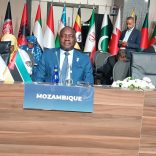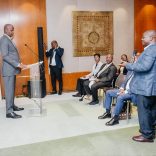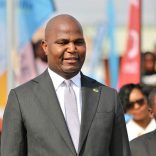Mozambique and Eswatini strengthen parliamentary cooperation
Mozambique: Government centralisation plans: 2 ‘governors’ in each province – By Joseph Hanlon

Map: DW
Under the label of ‘”decentralisation”, the government has submitted a centralisation plan to parliament – with many important omissions. The present centrally appointed governor is simply renamed the “Provincial Secretary of State”, while a new “governor” is elected. Both have offices and staff and overlapping responsibilities. (See below)
As part of the centralisation package the one existing elected district representation is removed. Until now, the provincial assembly was elected based on district lists, which meant the elected members had to come from their districts. This gave some power to political parties in the district to choose candidates and monitor spending in their district. Under the new draft law, there is a single provincial list, which is effectively no different from the provincial list for the Assembleia da Republica (national parliament) chosen by the party nationally or at provincial capital level.
Five draft laws have been presented to parliament, and are available on bit.ly/MocEl-Law. But there are major omissions. No financial decentralisation law is presented, so it remains totally unclear what financial powers the governor, secretary of state, and provincial assembly have. Under the current law, the governor has huge and arbitrary powers over money, land, and appointments. In negotiating decentralisation, the late Renamo head Afonso Dhlakama had expected Renamo elected governors to retain most of these powers, while the Frelimo government intends to simply transfer those powers to the appointed secretary of state.
Finally the new provincial electoral law (see below) corrects only one of the problems of the municipal elections and leaves other key aspects unchanged. And there is no proposal to change the national election laws.
No response to local election problems
Local elections in October 2018 showed a series of problems with the electoral laws, but so far there are no plans to resolve them (with one small exception – see below). Two key problems were:
+ There is no way to protest exclusion from election commission meetings, counts, etc. and no way to protest about actions taken at such meetings.
+ There is no requirement to inform party agents or even election commission members of meetings.
Taken together, these two allowed the Frelimo majority of district and city election commissions to have midnight meetings or meetings at an unusual location, without telling opposition aligned members, and then decide to change the results. Under the current law, this cannot be challenged.
Four other problems are:
+ Journalists have no rights to attend counts.
+ Transparency is not required for election commissions, allowing votes to be changed in secret.
+ Candidates who drop out from lists at the last minute cannot be replaced. This led to a list being barred from standing in Maputo, after candidates came under pressure and dropped out.
+ The law allows two avenues of protest, via the courts and to the National Elections Commission, but does not specify how these differ and which body has final say.
Impugnacao previa is a concept that requires protests to be made at the lowest possible level and they cannot be delayed to protest first at a higher court. This is sensible, but the law is written in such a way that a protest must be made at the meeting or event in which a decision is taken, which means that if an opposition nominated member of an election commission is illegally excluded from the meeting, they must protest first at the meeting they cannot attend. Similarly, any protests about actions taken at that meeting, such as changing results, must first be made at the meeting – so illegally excluded members cannot protest about secret recounts made by the Frelimo-aligned majority of an election commission.
The draft provincial assembly law (art 161) says that “Irregularities during the voting and in the partial, district or provincial tabulation can be appealed against, provided they have been the subject of complaint, protest or counter-protest.” This is repeated in a similar way in the present national election law (law 12/2014 art 174). But complaints, protests and counter-protests can only be made at the time of the decision.
Needed law change: There should be a brief extra clause that says if protest was not possible, then an appeal to a court remains possible.
Announcing & attending meetings. The draft provincial election law (art 233) says that observers are allowed to “attend district, city, province and central [CNE] counts”. Party agents (mandatarios) are allowed to attend the city, district and national count (art 124, 144) but not the provincial count. There is no provision for journalists to attend any of these counts. The national elections law (12/20014) has the same provisions. Despite the clear statement in the law, observers were barred from city election commission counts in several places during the October 2018 municipal elections and have always been barred from the National Elections Commission count.
Surprisingly, the laws set no rules for announcing meetings. There is no requirement to tell all members of the election commission or to inform observers, party agents or journalists. Thus any group of more than half of the commission members can hold a commission meeting – which cannot be protested by those not told because of the requirement to protest at the meeting. Clearly emergency meetings are sometimes necessary, but the law must require that people be informed.
Needed law changes:
1) District, city, provincial and national counts must be open to party agents, observers, and journalists.
2) Election commission meetings must be announced at least 8 hours in advance with a notice giving time and place posted in the normal location for notices. By prior arrangement, electronic posting, for example on Facebook, could be permitted as well.
Transparency: The present law sets few transparency guidelines and does not clearly define the powers of the National Elections Commission. The CNE has acted wisely in past elections, for example to exclude polling stations with ballot box stuffing and to correct obvious arithmetic errors in results sheets (editais). But these changes are never publicly reported. No other democracy allows the election commission to make such changes in secret, and Mozambique’s own law is violated when observers are not allowed to be present when changes are made during the national count.
Needed law change: Electoral commissions have the right to alter or exclude results sheets from lower levels, but a list of all such actions must be published with explanations.
Conflicts in the law: Changes in the law five years ago increased the ability to challenge electoral misconduct in the courts, without changing the appeal process to the CNE. But it did introduce a tighter schedule for court appeals than for CNE appeals which means the courts have ruled before the CNE has a chance to decide. Can the CNE make a different decision than a court, and overrule a court? The two appeal systems need to be clarified.
Similarly, it was probably never intended that people withdrawing as candidates at the last minute could not be replaced, so the calendar needs to be corrected in the law.
10 words to correct an unintended problem
One problem that surfaced in the municipal elections has been corrected in the proposed provincial elections law by adding just 10 words (art 13). The present law bans a candidate from standing if they stood down from the same position after the previous election. At least two people who were required by law to withdraw from city assemblies when they were later elected to the national parliament were barred from standing for city assembly in last year’s election because they had withdrawn in the previous term. The draft law simply add the phrase “which is not due to incompatibility provided for in Law,” which links to the national law (12/2013, art 161) which says that being a member of the national parliament is “incompatible” with being a member of a provincial or city assembly.
Ending district representation
The constitutional amendment to allow the election of the governors and mayors specifies an indirect election. Instead of voting separately for a governor or mayor, as in the past for mayors, the person elected to that post is the head of the party list which received the most votes. That worked for the election of mayors last year because the entire municipality is a constituency. But in the past for provincial elections, each district was a constituency and each party put forward a separate list for each district. This meant assembly members actually came from the district they represented, which meant they could be in much better touch with local people. But it also meant there was no provincial list from which to elect a governor.
The widely proposed option was simply to add a provincial list as well as the district lists, so that when a person voted for a party they actually voted for two lists. But as part of the centralisation proposals, government wants to abolish district lists and simply have a single provincial list. This means districts need no longer to be represented by local people chosen by local parties, and thus shifts power toward the centre.
Centralisation proposals create two competing provincial heads
The government’s “decentralisation” proposals create two almost identical structures in the province, the Provincial Executive Council under the elected governor, and a Secretariat of State for the Province named by central government. The matching structures are:
Provincial executive council, consisting of
+ Elected governor
+ Director of the Governor’s office
+ Provincial directors, named by governor, who report to governor but must carry out national policies and “technical-methodological” instructions sent by central government each year.
The Council can issue dispatches and regulations.
The provincial executive council controls its own receipts and has a plan and budget, which must be debated and approved by the provincial assembly and then ratified by the Secretariat of State.
The governor reports to the provincial assembly but is overseen by the Secretary of State.
Secretariat of State, consisting of
+ Appointed secretary of state
+ Director of the Secretary’s office
+ Director of Provincial Services
There are provincial delegates named by ministries, who report to ministries and only “coordinate” with the Secretary of State and governor.
The secretariat can issue dispatches and regulations.
The Secretariat of State meets every two weeks .
The Secretary or State has a plan and budget for central government activities.
The Secretary of State reports to the President.
They have equal responsibilities to encourage “citizen participation”, which will assure competing local meetings and contacts by the two power centres:
“The provincial decentralised executive governance body ensures the participation of citizens, local communities, associations and other forms of organisation whose purpose is to defend their interests.”
“The representative bodies of the State in the province shall ensure the participation of citizens, local communities, associations and other forms of organisation whose object is the defence of their interests.”
Both the Secretary of State and the elected governor have the responsibility to promote local development. Both are expected to ask the opinions of “community authorities”. But it is the Secretary of State and not the governor who gives official recognition to “community authorities” such as “traditional chiefs” and neighbourhood secretaries. In provinces where the governor is from an opposition party and the national president is from Frelimo, this will allow the Secretary of State to bypass opposition figures at local level and deal only with those linked to Frelimo.
An obvious overlap is that the Director of Provincial Services in the Secretariat “guides and supports economic and social units” while the Provincial Executive Council is responsible for “industry and commerce”.
Powers of the elected provincial administrations are limited. For example, in health they include only primary health care, and in tourism regulation of hotels only up to three stars. Central government controls minerals, energy, natural resources, and water bodies. Only central government can set or change taxes, restricting the fund-raising capacity of the province. Elected provincial government controls general and technical education, agriculture and fishing, land (as defined by the land law), housing, forests and conservation. There will be a provincial councils for the governor and secretary of state to coordinate their activities.
The new laws state specifically that they are intended to increase the “guardianship” (“tutela administrativa”) over elected provincial and municipal governments and give this power to the Secretariat of State. It can run inspections and investigations. It can participate in provincial assembly sessions and comment on provincial assembly decisions.
The provincial assembly meets four times per year for no more than five days each time, although special assembly sessions are possible and there is a commission which meets more often.
The official language of the assemblies is Portuguese. Members may speak any Mozambican language but must provide translation to Portuguese. The provincial assembly can receive petitions from the public.
Five draft laws have been presented to parliament, and are available on bit.ly/MocEl-Law.
By Joseph Hanlon












Leave a Reply
Be the First to Comment!
You must be logged in to post a comment.
You must be logged in to post a comment.